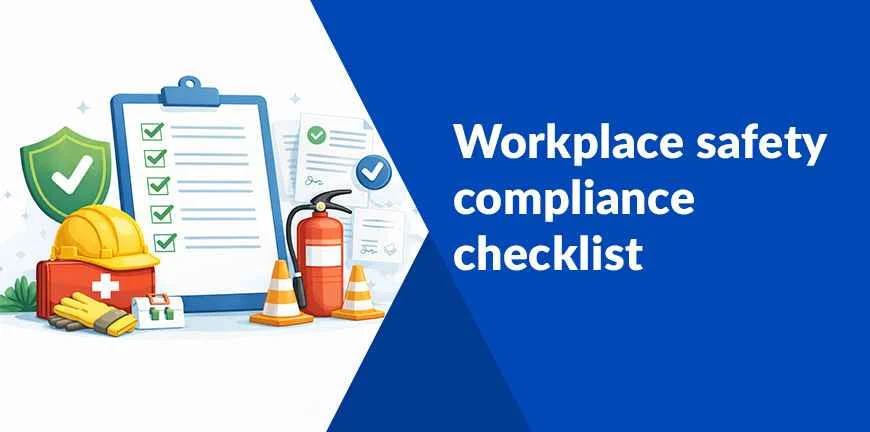
How HR Digital Transformation Works — Guide for Indian Businesses?
07/12/2025
How to Manage Multi-State Tax Compliance in India?
08/12/2025- Introduction
- Why Is Compliance Important for Businesses in 2026?
- How Does Compliance in a Company Impact the Workplace and Employees?
- What Happens If a Company Ignores Compliance?
- How Can Businesses Ensure Compliance Effectively?
- What are the Latest Trends in Business Compliance?
- Why Choose ALP Consulting for Compliance Management?
- Conclusion
- Key Takeaways
- Frequently Asked Questions
Introduction
In 2026, business compliance is more critical than ever as companies must operate in an environment shaped by rapid regulatory changes, data privacy mandates, ESG obligations, & increasing global scrutiny. Organisations that prioritise compliance not only prevent penalties & legal risks but also build stronger credibility with customers, employees, investors, & regulators holistically.
Compliance enables businesses to maintain operational continuity, safeguard sensitive data, foster a strong workplace culture, and compete confidently in a trust-driven market. Let’s take a deep dive into understanding the importance of compliance in business and explore ways to improve it for better outcomes.
Business compliance refers to an organisation’s responsibility to adhere to all legal, regulatory, & internal guidelines that ensure there are no instances of violations & operations run smoothly without disruptions. It strengthens governance, mitigates risks, & enhances credibility. The importance of compliance in business has grown to a stage where companies face stricter regulations, audits, & stakeholder scrutiny and cannot afford even a small mishap. Today, compliance is paramount for business operations & long-term growth.
Example: In 2018, Facebook faced a whopping $5 billion FTC penalty for violating data privacy regulations under the Cambridge Analytica scandal. This real-world case shows why there is a need for compliance in business, failing to which can lead to severe financial, legal, & reputational consequences for even the biggest companies.
Why Is Compliance Important for Businesses in 2026?
The core purpose of compliance is to identify and avoid possible red flags in your business. Business compliance practices also help your employees act responsibly.
The best business compliance program teaches employees to treat each other well at work, promote a high level of professionalism, and uphold corporate values inside and outside their workplace. It’s important to never take compliance for granted, as it can impact negatively both internally and externally on brand reputation. Below are some reasons that highlight the importance of compliance in business:
1. To Prevent Legal Liabilities
No business would be willing to get into any major legal disputes or face criminal charges due to non-compliance with the law. Not only are legal liabilities a big blow to your company’s reputation, but they can also be a cause of instant financial loss. Court hearings and appearances can be operational trouble for your business operations.
To be legally compliant involves not only learning essential legislation applicable to your business but also applying it effectively. As a rule of thumb, building a reputable public image is one successful way of promoting your business. If your company gets into trouble due to non-compliance, customers and shareholders might doubt your credibility. The key point here is not to forget that your client’s trust and loyalty are everything to your business.
2. To Enhance Business Growth
Understanding how compliance can create strong business standards, it is important to implement them as a factor to boost the growth of the company. It’s the organization’s way of creating a positive working environment and a healthy work culture. This can only be achieved if the organization has a clear model. This model can be a set of guidelines or policies that ensure employees’ and clients’ fairness and safety.
A company’s reputation and its exposure to legal liability risks. A poor track record of compliance can easily harm growth. Most of the legal regulations have been designed to promote best practices in key areas such as employee welfare, customer safety, and quality of service or product. Thus, meeting labor law compliance and sticking to other norms will naturally drive business growth.
3. To Enhance Public Relations
When you meet your legal obligations, one of the benefits of business compliance is the ability to showcase these on the organization’s marketing materials. Be it websites, social media, or other channels. For example, when you post about job advertisements, include the fact that you are an equal-opportunity employer. If you post the mission of your company on the website, state that you do not discriminate based on race, sex, creed, or sexual orientation.
When you recruit new employees, highlight your company’s commitment to physical safety at the workplace, along with mental health awareness. This can be done by referencing key policies and benefits dedicated to proactive healthcare and wellbeing, such as extended maternity and paternity leave or free gym memberships, or wellness leaves.
4. To Improve Operations and Safety
Having legal guidelines set in place for an organization can be one of the major benefits of compliance in a company. Regulations regarding discrimination and harassment help the organization create a better working environment for the employees, which can lead to more safety, security, and, in return, more worker productivity. The importance of compliance in business also plays a major role in physical safety. Following the rules helps prevent injuries, fires, or building evacuations that hurt the company’s profitability.
In addition to learning the bare minimum you need to do to meet your legal obligations, organizations also run mandatory courses that help new and existing employees to keep them reminded of the regulations the company follows. Attending and completing these is also a way to strengthen and safeguard your company’s operations and safety.
5. To Boost Employee Retention
Many business compliance troubles deal with protecting employees in case of an unfortunate event. Hence, it’s important for employees to feel that they work in a fair, professional, and safe environment. Evoking this feeling will make them build loyalty, and in turn, they will tend to stay with the company for a longer period.
It is the core responsibility of the company to ensure that none of the employees are victims of harassment of any sort, not just from anyone involved in the management, but also from co-workers. This might cost loyalty and the loss of valuable employees. Any extreme situations might also lead to the shutdown of the business. Including policies and procedures in your employee handbook that mirror your legal compliance obligations is always a good step.
Point to remember: a policy is only strong if it is enforced. Your policy should not only present the rules but also specify what is to be done if any regulations or rules are broken. Procedures and steps explained in simple, understandable language are important. Check in with managers or supervisors regularly to ensure complaints are handled properly and fairly.
How Does Compliance in a Company Impact the Workplace and Employees?
Here are 5 ways compliance creates a serious impact in the workplace & among employees:
1. Builds a Safe & Secure Work Environment
Compliance with safety, labour, & workplace regulations ensures employees experience hazard-free working conditions. This will reduce accidents & injuries, boost well-being & create a physically & psychologically secure environment.
2. Strengthens Trust & Transparency
Clear compliance policies build trust between employees & management. When rules are consistently applied, employees feel respected, protected, & confident in the organisation’s fairness & ethical standards.
3. Enhances Productivity & Focus
A compliant workplace minimises disruptions, legal issues, & operational risks. Moreover, employees can focus on meaningful work without fear of violations, penalties, or unexpected workplace uncertainties impacting daily tasks.
4. Improves Employee Morale & Engagement
When companies follow ethical practices and protect employee rights, morale increases. People feel valued, engaged, and motivated to contribute to a culture that prioritises their safety, fairness, and growth.
5. Reduces Conflict & Promotes Inclusivity
Compliance ensures anti-discrimination, diversity, & equal-opportunity policies are enforced. This reduces workplace conflicts, prevents bias, and fosters an inclusive environment where everyone feels respected and treated equally.
What Happens If a Company Ignores Compliance?
Here are 5 consequences faced by companies for non-compliance or ignoring the need of compliance in business:
1. Heavy Financial Penalties
Non-compliance instances, in most cases, result in hefty fines that can reach several crores in certain situations, legal settlements, & compensation payouts. These unexpected costs will strain cash flow, impact profitability, & may derail ongoing business operations or future expansion plans significantly.
Example: The RBI imposed a fine of Rs. 21 lakhs on PhonePe for non-compliance with prepaid payment instrument (PPI) regulations. The company’s escrow account balance fell short of outstanding liabilities, & the shortfall wasn’t reported promptly to authorities.
2. Legal Action & Criminal Liability
Ignoring the importance of compliance in business can trigger lawsuits, regulatory actions, or criminal charges against leadership. This exposes the company to court proceedings, sanctions, licence cancellations, & long-term operational restrictions enforced by authorities.
Example: Executives at Enron, including the CEO & CFO, engaged in sophisticated accounting fraud to conceal billions of dollars in debt & inflated earnings. This resulted in the former CEO being imprisoned for 14 years, in prison & the former CFO being incarcerated for 5+ years.
3. Severe Reputational Damage
Compliance failures damage public trust, customer loyalty, & brand credibility. Negative media attention & stakeholder backlash can lead to lost business, investor withdrawal, & long-term challenges in rebuilding market reputation.
Example: In May 2025, RBI fined ICICI Bank (Rs. 97.8 lakh), Axis Bank (Rs. 29.6 lakh), Bank of Baroda (Rs. 61.4 lakh) & others for compliance violations covering cybersecurity, KYC norms, & internal account misuse. This can seriously damage the credibility and reputation of the banks, leading to a drop in new account openings and existing customers opting for a different bank.
4. Business Disruptions & Operational Shutdowns
Authorised regulators may suspend operations, revoke permits, or halt projects due to violations. These disruptions delay deliveries, impact productivity, & may cause supply chain breakdowns or complete business discontinuity.
Example: Discord.io, a TPA for the Discord messaging platform, suffered a major data leak in 2023. This breach exposed the personal information of nearly 760,000 users, including billing addresses, salted passwords, & in some instances, direct messages. Shortly after this incident became viral, the company announced that it was immediately shutting all operations & closing its entire website & services.
5. Loss of Talent & Internal Morale
Employees resist working for companies with unethical or unlawful practices. Non-compliance elevates attrition rates, reduces engagement, & makes it difficult to attract skilled talent due to a tarnished organisational culture.
Example: The internal compliance & ethical failures at Uber in 2017 led to a culture crisis that resulted in high attrition rates, difficulty recruiting, & a massive internal turbulence.
How Can Businesses Ensure Compliance Effectively?
Here are 5 ways businesses can maximise the benefits of compliance and make it more effective.
1. Implement Strong Internal Policies
Create clear, updated company policies aligned with laws & industry regulations. Ensure every employee is well aware of compliance expectations via documentation, regular updates, & easily accessible guidelines across all departments.
Example: Infosys follows a detailed global compliance manual & mandatory employee certification model. This ensures all staff understand ethical standards, anti-corruption rules, & regulatory obligations across international markets.
2. Conduct Regular Training & Awareness Programs
Provide compulsory compliance training, role-based workshops, & refresher sessions. This makes sure employees have complete acumen of legal obligations, ethical standards, data protection rules, & repercussions of violations across everyday business operations.
Example: Tata Steel runs continuous safety & compliance training across all its plants across India. This compliance-first approach significantly reduces workplace incidents & ensures adherence to environmental, labour, & operational regulations.
3. Use Technology & Automated Compliance Tools
Adopt compliance management software, audit tools, HRMS systems, & automated monitoring platforms. These state-of-the-art solutions track regulatory changes, flag risks, maintain records, & reduce manual errors, ensuring consistent adherence to rules.
Example: HDFC Bank has deployed advanced AML & real-time monitoring systems that flag suspicious transactions within a fraction of a second, helping the bank stay compliant with RBI’s evolving KYC & anti-fraud regulations.
4. Perform Periodic Internal Audits & Risk Assessments
Schedule internal compliance audits to identify gaps, process risks, & policy violations. Moreover, risk assessments help organisations proactively address weak areas before regulators point them out or compliance issues escalate.
Example: HDFC Bank uses advanced AML & real-time monitoring systems that flag suspicious transactions instantly, helping the bank stay compliant with RBI’s evolving KYC & anti-fraud regulations.
5. Build a Compliance-Focused Culture
Encourage ethical behaviour, transparency, open reporting, & whistleblower protection. Moreover, leadership must reinforce compliance as a non-negotiable priority, enabling employees to follow rules confidently without fear of retaliation or confusion.
Example: Reliance Industries performs persistent internal audits across business units to pinpoint compliance gaps early, strengthening financial governance, operational controls, & reporting accuracy.
What are the Latest Trends in Business Compliance?
Here are the latest trends in 2026 that make the importance of compliance in business stand out:
1. AI Governance & Algorithmic Oversight
Businesses must lay frameworks that involve AI-driven decisions, ensuring transparent audit trails, bias mitigation & regulatory alignment with algorithms.
2. ESG & Sustainability Compliance Intensifies
Stronger disclosure laws & environmental-human rights due diligence will push companies to track & report ESG performance across operations & supply chains.
3. Supply-Chain & Third-Party Risk Monitoring
Extended oversight now covers supplier compliance, subcontractors’ ethics, cyber-resilience & regulatory exposure outside the organisation’s direct operations.
4. Regulatory Fragmentation & Divergence
Regulations will increasingly diverge across jurisdictions, creating complexity for global businesses to synchronise compliance versions & keep up with constant changes.
5. Automated Compliance Tools & RegTech Adoption
Companies are leveraging AI, blockchain, & advanced analytics to make compliance workflows more automated and sleeker, which will facilitate real-time monitoring & regulatory reporting.
Why Choose ALP Consulting for Compliance Management?
Alp Consulting, a leading end-to-end compliance management agency, helps companies achieve 100% business compliance via a blend of expert guidance, automated processes, & deep regulatory knowledge across industries. With 3 decades of experience, ALP ensures A-Z compliance management, covering labour laws, payroll regulations, statutory filings, audits, & multi-state legal requirements.
Our dedicated compliance specialists with elite-level expertise proactively track regulatory updates, mitigate risks, & ensure error-free, on-time submissions. ALP’s tech-enabled systems minimise manual effort & enhance accuracy, while their Pan India presence ensures consistent compliance across all locations. With Alp Consulting, businesses can operate confidently, avoid penalties, & maintain a strong, audit-ready governance framework.
Conclusion
In 2026, business compliance is no longer optional; it is a strategic mandate for long-term success. Strong compliance safeguards organisations from legal, financial, & reputational risks while building a culture of integrity, trust, and operational excellence.
The key advantages of compliance are that it protects employees, strengthens governance, enhances public credibility, & opens doors for sustainable business growth.
With increasing regulations & global scrutiny, companies need a reliable compliance partner. Alp Consulting empowers organisations to stay compliant, minimise risks, & operate confidently in an ever-evolving regulatory landscape.
Key Takeaways
- Compliance prevents legal, financial, and reputational risks while strengthening business stability and trust.
- Strong compliance builds safer workplaces, an ethical culture, & higher employee engagement across all levels.
- Ignoring compliance leads to penalties, operational disruptions, and long-term brand credibility damage.
- Technology upgrades & audits help businesses stay updated with evolving regulations and ensure accuracy.
- ALP Consulting delivers end-to-end compliance support for seamless, risk-free, audit-ready operations nationwide.
Frequently Asked Questions
1. What does business compliance mean?
Business compliance means following all legal, regulatory, & internal rules to ensure ethical operations, avoid risks, and maintain organisational integrity.
2. What happens if a company is non-compliant?
Non-compliance in compliance leads to heavy penalties, legal actions, reputational damage, operational disruptions, & loss of stakeholder trust, harming long-term business growth.
3. How can companies maintain compliance easily?
Companies can stay compliant via clear policies, regular training, automated compliance tools, internal audits, & a strong culture of transparency and accountability.
4. Why is HR compliance crucial in 2026?
HR compliance is paramount due to evolving labour laws, data privacy rules, remote work policies, & growing expectations for ethical, inclusive workplace practices.
5. Does ALP Consulting provide compliance services?
Yes, ALP Consulting offers end-to-end compliance services covering labour laws, payroll regulations, audits, filings, & multi-state statutory requirements nationwide.
6. What are some examples of compliance in business?
The typical examples include labour law compliance, data privacy protection, tax filings, workplace safety rules, environmental regulations, financial reporting standards, and anti-corruption policies.
7. What are the advantages & disadvantages of ethical compliance in business?
The key advantages of compliance include trust, stability, and reduced risks. On the other hand, disadvantages may involve higher costs, training needs, stricter controls, & slower decision-making processes.
8. Why is business compliance essential for smaller organisations?
Compliance protects small businesses from penalties, builds credibility, ensures smooth operations, & helps them compete confidently with larger, well-regulated companies.
Contact Us For Business Enquiry

Hariharan Iyer
Hariharan Iyer is the Vice President – Operations at ALP Consulting, bringing over 40+ years of experience in HR outsourcing and labour law compliance. He leads end-to-end HRO operations, ensuring process efficiency, statutory compliance, and seamless service delivery for clients across industries. With a strong background in labour law governance and workforce management, Hariharan plays a key role in driving operational excellence and compliance-led HR solutions at ALP Consulting.





